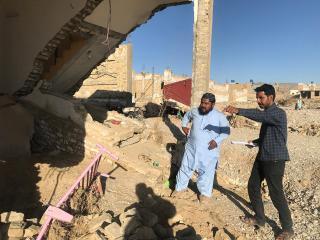Danish Murad is one of many volunteers assisting people who have been affected by the recent floods caused by heavy monsoon rains in Pakistan. He is distributing food rations and household supplies and surveying the damage suffered by the people for the district administration in Balochistan. Currently working as a reporter for the GNN News national channel; his prior experience as a national UN Volunteer stirred him to respond to the flood crisis in his region.
The floods in Pakistan have caused extensive loss of life and devastation. Approximately 33 million inhabitants are reported to have been affected, while preliminary estimates indicate that around 7.6 million people may be temporarily displaced.
To date, more than 1.14 million houses have been damaged and over 765,000 houses have been destroyed across the country, according to the National Disaster Management Authority (NDMA), while over 1,500 deaths and more than 12,800 injuries were recorded since mid-June, including 552 children killed and over 4,000 children injured.
Efforts to verify the extent of displacement are ongoing and the situation is anticipated to worsen. Danish Murad, a former national UN Volunteer with the United Nations Development Programme (UNDP) in Pakistan has been on the frontline, volunteering with local organizations to distribute food rations and other household supplies in Balochistan, the largest region of the country that has been most affected by the floods.
When the floods hit my country, I felt that it was my duty to support the affected people. Once a UN Volunteer, always a volunteer is a saying that captures my spirit. --Danish Murad, former national UN Volunteer with UNDP, Pakistan
"I started collecting donations by myself to help the victims by distributing food rations and other daily sustenance. Later, I received support from other colleagues who donated different household items. We believed that we should not wait for the resources to come in from the government and partners, so we started to support the affected people in our circle," he adds.
Danish visited people who were in the most affected areas in Saryab, eastern and western bypass, Nawa Killi, Hanna Uraak, Hazarganji and other places. He is also conducting surveys of people affected and damage for the local administration.
Painting a picture of what he saw, Danish recalls that in his areas, there was water of more than 2 to 4 feet in the provincial capital. So many people lost their lives, while hundreds of houses and other infrastructure were devastated.
Till now, a lot of people don't have anything to eat. Their businesses and livelihoods, as well as school buildings have been destroyed. There has been no gas, electricity, mobile service or internet for 15 days as well, because the floods interrupted all systems. Balochistan province is totally in blackout from the rest of the country and the entire world. --Danish Murad
As heavy rains continue, the humanitarian situation remains precarious in flood-affected areas of Pakistan, with widespread damage to physical infrastructure and ongoing harm to people and livestock.
More than 5,500 undamaged schools are reportedly being used to shelter people who have been displaced. Another 22,000 schools have reportedly been damaged – over 17,400 in Sindh, over 2,300 in Balochistan, over 1,400 in Khyber Pakhtunkhwa and some 1,250 in Punjab.
Preliminary estimates based on currently available data indicate that some 7.6 million people may be displaced due to the heavy rains and floods, including some 575,000 people living in relief camps. Several humanitarian teams are on the ground supporting the Government-led response, prioritizing urgent needs and providing life-saving assistance, including shelter, food and access to clean water.
The United Nations Volunteers (UNV) programme is working with UN partners in Pakistan to deploy skilled and motivated UN Volunteers to help respond to, and recover from, the floods.
If you wish to recruit UN Volunteers, check the UNV partner toolkit: https://toolkit.unv.org/ or reach out to UNV Country Coordinator Waseem Ashraf.
If you wish to apply to available volunteering opportunities, register in the UNV global talent pool via app.unv.org and check current openings.


